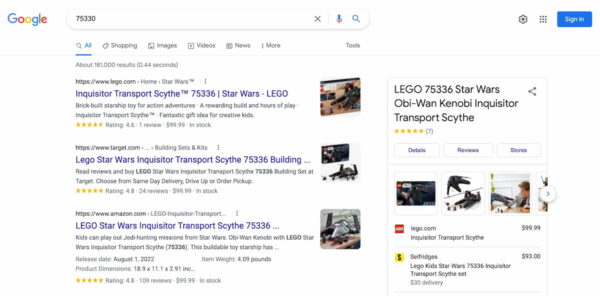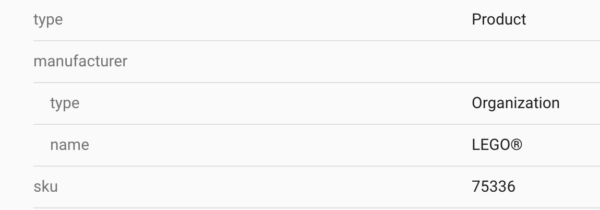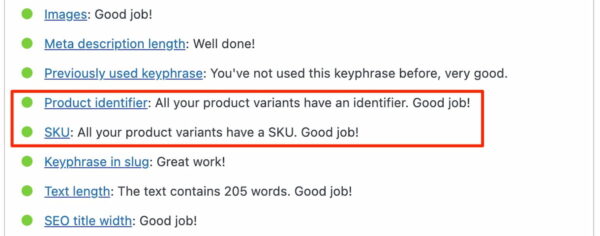Product identifiers like SKU and GTIN are essential for ecommerce SEO

Every product you buy has — or should have — a unique code identifying it. This product identifier comes in many forms, like an SKU, EAN, ASIN, or ISBN, depending on the product, where you sell it, or the area where you live. Adding a unique product identifier to your product is essential if you want to help Google understand your product. Outputting it in the product Schema is the secret.
What are product identifiers?
There are billions of products out there, and almost every proper one has a unique code to identify it. One of the most used unique product identifiers is the GTIN or the Global Trade Item Number. These come in various forms, like GTIN8, GTIN12 (also known as the UPC, the Universal Product Code), or GTIN13 (also known as the EAN or the European Article Number). Amazon has its product identifier: ASIN, the Amazon Standard Identification Number).
Product identifiers are used in many different ways. For instance, your customer can use these codes to search for your product in search engines like Google. On the other hand, Google can use that code to look up your product in its giant index to return a result that might highlight your product in a specific way.
Why you should add product identifiers to your products
Product identifiers help your customers — and Google! — to correctly identify your product. As there are so many products out there, it’s good that we can fall back on a great system to identify them. So it makes sense to add as many details about your products as possible, including the different product numbers like the SKU and GTIN.
There are several reasons why you should add these to your products:
- They’re recommended properties for Google to present your products as a rich result. If you don’t add them, the Rich Results test will show a warning, and you won’t get a fully-formed rich result for your product.
- People use product identifiers to search in Google for that particular product
- It adds a sense of trust to the product page because people can verify that this is the particular product they are looking for.
Adding product identifiers helps your ecommerce SEO, no question about it!
An example of a product identifier in Google
Many people use SKUs to search for a specific product on Google. Take LEGO fans, for instance — they live for the SKU codes that LEGO provides. Every set gets a unique five-digit number that makes a set instantly recognizable. For example, the LEGO Star Wars Inquisitor Transport Scythe set is number 75336. This number features prominently on the box, the catalog, and the website. In addition, every store selling LEGO worldwide will use this number in their product descriptions.

Of course, this is not the only product identifier that corresponds with this article. Every article also gets a barcode — an EAN or a UPC. This is the code that stores use to scan the product once it’s been sold to a customer. For the US version of this LEGO set, that would be 673419357562. You can find this code on the back or bottom of the box.

Product structured data needs an SKU or GTIN
While SKU and GTIN are only recommended properties for Google to understand your product, we think they are more important than that. Also, Google will show warnings in the Rich Results Test if you don’t add them, so that should be enough for you to add product identifiers. Adding these details to your WooCommerce products will give Google more to learn about your product. You should provide as many details as you can. With WooCommerce SEO, we output all these details in product structured data that search engines love.

Getting it done with Yoast SEO for WooCommerce
Yoast WooCommerce SEO is the add-on you need if you care about getting better results with your ecommerce store. Recently, WooCommerce SEO got a new feature that helps you add global identifiers to product variants — which is impossible in WooCommerce by default. Another cool new feature enables you to add those essential product details: the product identifier/SKU check.
Product identifier/SKU check in WooCommerce SEO
It can be a challenge to keep up with all your products and all the different variants of your products. Sometimes, you forget to add a piece of product information or don’t use the proper product identifiers. Luckily, we thought of a solution for customers using our WooCommerce SEO add-on for Yoast SEO: the product identifier check.
The product identifier check is very straightforward; open or make a product (variant) in WooCommerce and fill in the details. You’ll see the analysis activate and notify you in the case of missing product identifiers. Fill these in, and you will get a nice green bullet!
There are two parts to the new check, one checks for the availability of the SKU in the product details. The other checks for additional product identifiers like the GTIN, EAN, or UPC. The cool thing is that it works for both individual products as well as products that have product variants.
This check ensures you’ll never again forget to tell Google about your product. Moreover, we’ll wrap up your product details neatly in our product Schema to output the data we generate with WooCommerce SEO and Yoast SEO.
The goal of the check is to help you get the correct schema output for products, which improves your chances of getting that nice rich result for your products!

Offer complete product data to Google
Adding identifiers to your products helps everyone understand your product better. Customers use it to search for your product and to check whether it is the proper one. Conversely, Google uses product identifiers to match your product to the information it has in its major index.
With WooCommerce SEO, we remind you to add the SKU and product identifiers so we can add those details to the product Schema we generate for your products. By doing so, you are making it easier for Google to understand your product — and increasing the chance of getting rich product results.

